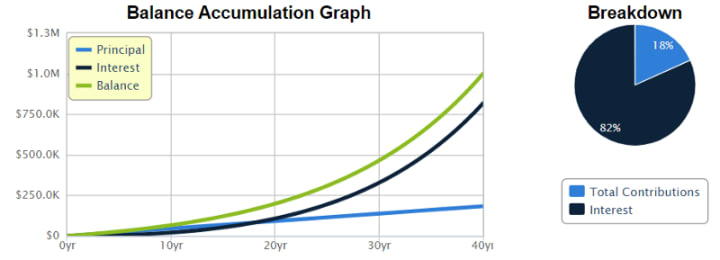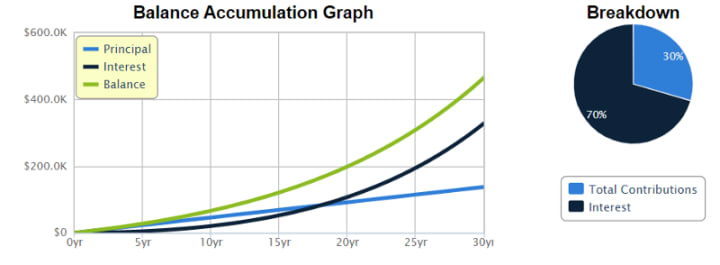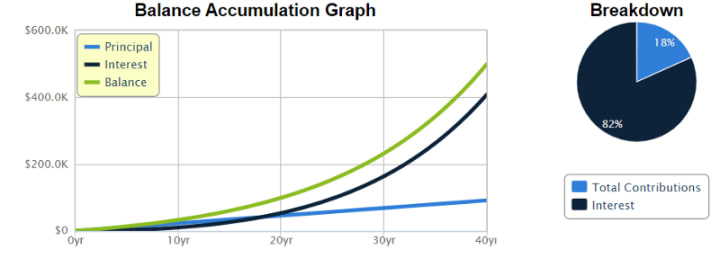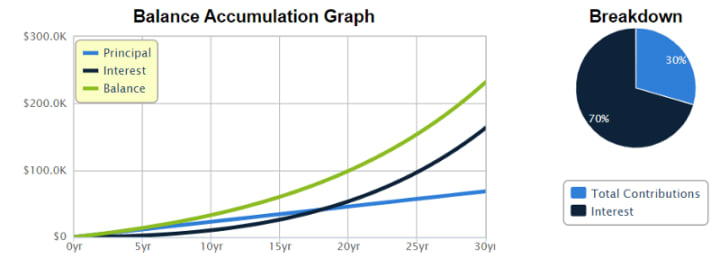
Everyone has their own different journey in life. And while life is not just all about money, it does have a profound impact on how we get to live our lives and the livelihood that we get to enjoy.
It's important to consider our time wisely if we want a comfortable life later on. For some this, may mean retiring early so that they can pursue their passions and interest, for others it may be having an extra supplement of income to cushion themselves while still working, and for the rest, they might want a sum to save up so that when they eventually do retire at 65, they have money to live off. Regardless of the goal, considering the time you have right now can make a huge difference in your investing journey.
"You will never find time for anything. If you want time, you must make it." - Charles Buxton
Let's look at this example:

- Let's say you are 25 years old and you invest until you are 65 years old (40 year period).
- You invest in an investment that provides you with a 7% rate of return based on the S&P 500 ETF's. According to Investopedia, from 1950 to 2021, the S&P 500 has yielded an annualized average return of 11.61% (Note that this is an average annual return, each year varies, depending on whether it's a bear or bull market. Also, past performance does not guarantee future performance.)
- Your end goal is $1,000,000 when you reach 65 years old.
- This assumes no changes in contribution, rates of return and inflation of your investment.
You would need to just contribute $ 381 per month ($4,572 per year) to get to $1,000,000.

Now let's say you wait until you are 35 years old to invest until you are 65 years old (30 year period).
Let's say you contributed the same $381 per month ($4,572 per year) you would only get $464,809

The 10 years from age 25 to age 35 can have a huge impact. The opportunity of earning $535,191 ($1,000,000- $464,809) is lost if you start later by 10 years. This result of not investing $45,720 (381 per month x 12 months x 10 years) will cost you $535,191 of foregone return on your investment if you chose not to invest during the 10 years (from age 25- 35).
In summary, waiting to not contribute $45,720 (381 per month x 12 months x 10 years) will cost you $535,191 ($1,000,000- $464,809) because your money didn't have the additional 10 years to compound and build in value.
Example 2

Let's revise this end figure to $500,000 when you reach 65 years old with all the same assumptions above.
Assuming you start at 25 years old, you would need to contribute $190 monthly ($2,280 per annum) to get to $500,000 upon reaching 65 years old, at a 7% rate of return.

Now let's say you wait until you are 35 years old to invest until you are 65 years old (30 year period).
Let's say you contributed the same $190 ($2,280 per annum) you would only get $231,794.

The 10 years from age 25 to age 35 can have a huge impact as previously mentioned. The opportunity of earning $268,206 ($500,000- $231,794) is lost if you start later by 10 years. This result of not investing $22,800 (190 per month x 12 months x 10 years) will cost you $268,206 of foregone return on your investment if you chose not to invest during the 10 years (from age 25- 35).
In summary, waiting to not contribute $22,800 (190 per month x 12 months x 10 years) will cost you $268,206 ($500,000- $231,794) because your money didn't have the additional 10 years to compound and build in value.
If you still wish to get to the $500,000 goal, when you start investing at 35 years old, you would need to contribute $410 per month($4,920) to get to $500,000 upon reaching 65 years old at a 7% rate of return.
You must gain control over your money or the lack of it will forever control you. - Dave Ramsey
Why most people are reluctant to invest?

- Fear
- They feel that they don't know too much about the stock market.
- They do not have disposable cash to invest.
"I will tell you the secret to getting rich on Wall Street. You try to be greedy when others are fearful. And you try to be fearful when others are greedy." - Warren Buffett
How do you remedy this:
1. Focus on low-cost index funds.
For example, if picking individual stocks may seem like too much of a hassle and a challenge, a low-cost index fund may be a viable option. When you buy individual stocks you need to consider many ratios, company performance, prospectus, company potential etc. Having an ETF, index fund or mutual gives you a diversified portfolio and spreads out the risks.
2. Just start
There is no perfect opportunity to start. You just have to take the plunge and do it. The longer that you wait, the more amount of money you need to contribute to achieving the initially desired goal as your money has less time to compound and grow.
3. Read on the financial markets
Stay up to date on the market news on Yahoo finance, Google, Market watch, Morning star and Financial times on companies that are of interest to you.
While you can certainly sit back and relax and just let your investments compound, it's always good to stay up to date on investment news so that you can buy stocks during a dip at a bargain price. Additionally, you may also want to invest in growth or value stocks that are of interest to you.
4. Make sure you have an emergency fund (3–6 months saved up) and high-interest debts are paid months (high interest being more than 7%).
If your debt is higher than 7% it is better to pay down the debt since the stock market return on average for the past decade-plus years is 7%.
Consider building at least $1,000- $2,000 in your emergency fund or 3–6 months worth of living expenses so you don't need to borrow credit or take out a loan during emergencies.
5. Let your investments grow and compound
Just sit back and relax. There is no complicated work is required on your end here, but to let your investments grow and compound.
"Time is free, but it's priceless. You can't own it, but you can use it. You can't keep it, but you can spend it. Once you've lost it, you can never get it back." - Harvey MacKay
Conclusion
Choosing to not take action when you are young early will have adverse consequences later on in life. Don't let your life be defined by what you didn't know or didn't do. Take action and claim your adulthood, you're choosing your life right now!






Comments
There are no comments for this story
Be the first to respond and start the conversation.